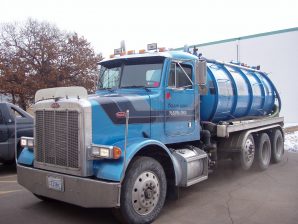Let’s talk about inflammable waste traps. They are a part of your sewer septic system, designed to intercept and trap inflammable materials so they don’t flow into sewer lines, creating a dangerous, explosive mixture. These materials are held in a large, leak-proof steel basin. Sediment settles, and inflammable waste rises, so the leftover wastewater can be safely discharged to a sewer-treatment facility. From time to time, the inflammable waste buildup needs to be safely removed and disposed of, and that’s when Drain King can help.
So what is inflammable waste? Since inflammable means “capable of being set on fire,” it could be matter in any of its forms ‑ solid, liquid, or gas (vapor). It can be the by-product of a manufacturing process or a discarded commercial product. Examples include, but are not limited to: waste ethanol, methanol, hexane, acetic acid, acetone, motor oil, paints and solvents, aerosols, and cleaning agents. Inflammable waste is characterized by its flash point (the lowest temperature at which a particular organic compound gives off sufficient vapor to ignite in air) of less than 60 C (140 F).
Great care needs to be taken when handling such volatile compounds, to prevent the risk of explosion and/or environmental contamination. In the early 1900s, long before such contaminants were regulated, serious explosions were a regular problem for industrial cities like Pittsburgh, Boston, and New York. In a single year, these three cities suffered six explosions caused by gasoline vapor, resulting in many deaths and severe injuries, as well as physical damage to the sewer lines, buildings, and streets.
Inflammable waste traps may be installed above or below ground. While tanks should be constructed of a leak-proof material, it is important to have them regularly inspected to make sure the waste is fully contained. It is imperative that underground tanks be accessible at ground level for waste removal and inspection. Consider installing an audio and visual alarm that will detect waste levels and alert you when the tank reaches 75 percent of its total capacity. If you choose not to install an alarm, we can manually measure your liquid levels on a monthly basis to gauge the rate of fill. Inflammable waste traps that are not cleaned regularly may allow oils and other chemicals to leak into a septic or sewer system, contaminating wastewater and causing costly cleanup and disposal.
The professionals at Drain King have the knowledge, experience, and equipment to safely and correctly dispose of all types of inflammable waste. Trust us to do your job right the first time.




